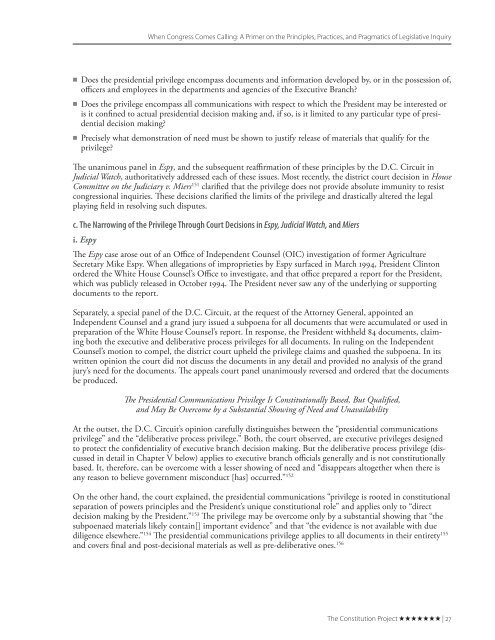When Congress Comes Calling
WhenCongressComesCalling
WhenCongressComesCalling
Create successful ePaper yourself
Turn your PDF publications into a flip-book with our unique Google optimized e-Paper software.
<strong>When</strong> <strong>Congress</strong> <strong>Comes</strong> <strong>Calling</strong>: A Primer on the Principles, Practices, and Pragmatics of Legislative Inquiry<br />
33<br />
33<br />
33<br />
Does the presidential privilege encompass documents and information developed by, or in the possession of,<br />
officers and employees in the departments and agencies of the Executive Branch?<br />
Does the privilege encompass all communications with respect to which the President may be interested or<br />
is it confined to actual presidential decision making and, if so, is it limited to any particular type of presidential<br />
decision making?<br />
Precisely what demonstration of need must be shown to justify release of materials that qualify for the<br />
privilege?<br />
The unanimous panel in Espy, and the subsequent reaffirmation of these principles by the D.C. Circuit in<br />
Judicial Watch, authoritatively addressed each of these issues. Most recently, the district court decision in House<br />
Committee on the Judiciary v. Miers 151 clarified that the privilege does not provide absolute immunity to resist<br />
congressional inquiries. These decisions clarified the limits of the privilege and drastically altered the legal<br />
playing field in resolving such disputes.<br />
c. The Narrowing of the Privilege Through Court Decisions in Espy, Judicial Watch, and Miers<br />
i. Espy<br />
The Espy case arose out of an Office of Independent Counsel (OIC) investigation of former Agriculture<br />
Secretary Mike Espy. <strong>When</strong> allegations of improprieties by Espy surfaced in March 1994, President Clinton<br />
ordered the White House Counsel’s Office to investigate, and that office prepared a report for the President,<br />
which was publicly released in October 1994. The President never saw any of the underlying or supporting<br />
documents to the report.<br />
Separately, a special panel of the D.C. Circuit, at the request of the Attorney General, appointed an<br />
Independent Counsel and a grand jury issued a subpoena for all documents that were accumulated or used in<br />
preparation of the White House Counsel’s report. In response, the President withheld 84 documents, claiming<br />
both the executive and deliberative process privileges for all documents. In ruling on the Independent<br />
Counsel’s motion to compel, the district court upheld the privilege claims and quashed the subpoena. In its<br />
written opinion the court did not discuss the documents in any detail and provided no analysis of the grand<br />
jury’s need for the documents. The appeals court panel unanimously reversed and ordered that the documents<br />
be produced.<br />
The Presidential Communications Privilege Is Constitutionally Based, But Qualified,<br />
and May Be Overcome by a Substantial Showing of Need and Unavailability<br />
At the outset, the D.C. Circuit’s opinion carefully distinguishes between the “presidential communications<br />
privilege” and the “deliberative process privilege.” Both, the court observed, are executive privileges designed<br />
to protect the confidentiality of executive branch decision making. But the deliberative process privilege (discussed<br />
in detail in Chapter V below) applies to executive branch officials generally and is not constitutionally<br />
based. It, therefore, can be overcome with a lesser showing of need and “disappears altogether when there is<br />
any reason to believe government misconduct [has] occurred.” 152<br />
On the other hand, the court explained, the presidential communications “privilege is rooted in constitutional<br />
separation of powers principles and the President’s unique constitutional role” and applies only to “direct<br />
decision making by the President.” 153 The privilege may be overcome only by a substantial showing that “the<br />
subpoenaed materials likely contain[] important evidence” and that “the evidence is not available with due<br />
diligence elsewhere.” 154 The presidential communications privilege applies to all documents in their entirety 155<br />
and covers final and post-decisional materials as well as pre-deliberative ones. 156<br />
The Constitution Project | 27


